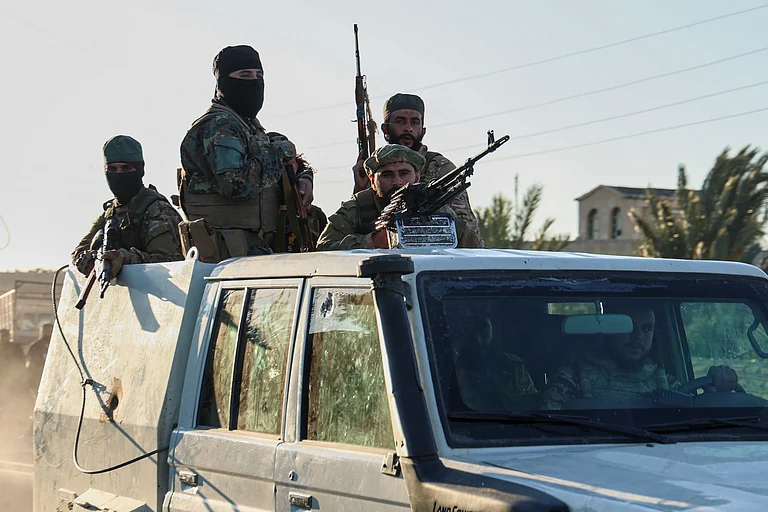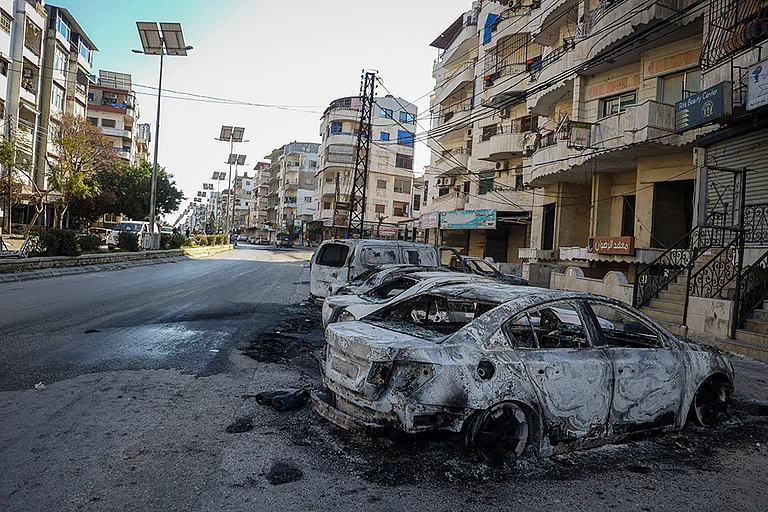Syria deployed troops to the southern province of Sweida earlier this week under the belief that it had tacit approval from both the United States and Israel, according to eight sources cited by Reuters familiar with the matter.
The move, intended to quell communal violence in the Druze-majority region, was followed by Israeli airstrikes on Syrian forces and locations in Damascus, in what Reuters sources described as a miscalculation by Damascus regarding the response from Israel and the United States.
The sources – which included Syrian political and military officials, diplomats, and regional security contacts, according to Reuters – said the Syrian government interpreted public and private messages from U.S. special envoy Thomas Barrack as a signal of support for restoring central government authority throughout Syria. Barrack has consistently stated that Syria should be governed as a unified state, without autonomous regions.
A State Department spokesperson declined to comment on private diplomatic communications but reiterated Washington’s position in support of Syria’s territorial unity. “The Syrian state has an obligation to protect all Syrians, including minority groups,” the spokesperson said, calling on the Syrian government to hold those responsible for violence to account.
The Syrian foreign ministry denied that U.S. statements had influenced the decision to deploy forces. A senior official told Reuters the operation was based on “purely national considerations” aimed at halting bloodshed, protecting civilians, and preventing further escalation.
On Monday, Syrian troops and tanks entered Sweida in response to escalating clashes between Bedouin tribes and Druze militias. Syrian forces were met with armed resistance and, according to Syrian and regional sources cited by Reuters, were later implicated in violence against Druze civilians, including field executions. This prompted Israeli airstrikes on Syrian military targets, the defence ministry, and areas near the presidential palace.
Israel has long viewed southern Syria as a demilitarised zone. Prime Minister Benjamin Netanyahu said Israeli forces intervened to prevent Syrian troops from consolidating control in Sweida and to maintain commitments to the Druze community.
Syrian President Ahmed al-Sharaa has pledged to hold perpetrators accountable, blaming “outlaw groups” for acts of violence and denying direct involvement of regular forces, according to a statement reported by Reuters.
According to Reuters reporting based on one Western and one Syrian source, Damascus believed it had reached a preliminary understanding with Israel during recent talks in Baku over its troop movement into the south. That understanding, however, appears to have broken down.
Joshua Landis, Director of the Center for Middle East Studies at the University of Oklahoma, told Reuters the Syrian leadership appeared to have misinterpreted messages from the United States and Israel. “It seems that his military staff misunderstood the backing of the U.S. It also misunderstood Israel's stand on the Jabal Druze (in Sweida) from its talks with Israel in Baku,” Landis said.
A Syrian military official also told Reuters that U.S. officials had been informed in advance of the planned deployment and had not objected, leading Damascus to believe that there would be no Israeli response.
Reuters quoted a diplomat based in Damascus as saying Syrian officials had acted with “overconfidence,” misreading U.S. messaging that ultimately “did not reflect reality.”
Envoy Barrack has spoken against federalism in Syria, suggesting that minority groups, including Druze, Kurds, and Alawites, should not govern autonomously. That stance has reportedly increased distrust of the Islamist-led Syrian government among those communities. Kurdish and Druze groups have resisted Syrian Army deployments and demanded their fighters be integrated into national forces only if they remain in their own regions.
A senior Gulf Arab official told Reuters the operation in Sweida was mishandled by Damascus. “The troops committed violations, including killings and the humiliation of Druze. That gave Israel an opening to strike,” the official said.
The Syrian Network for Human Rights reported on Friday that at least 321 people had been killed in the Sweida violence, including medical staff, women, and children. The group attributed field executions to multiple actors but could not determine responsibility in all cases. Reuters verified some of the video footage but was unable to confirm the perpetrators.
One regional intelligence source told Reuters that President Sharaa struggled to maintain control over events due to reliance on a loose network of militias, some of which have roots in Islamic militant groups. In a separate incident earlier this year, hundreds of Alawites were reportedly killed in sectarian violence along the Syrian coast, involving forces aligned with Sharaa’s administration.
Amid worsening violence and mounting distrust among minority groups, the Gulf official warned of the possibility that Syria could fragment into autonomous regions, Reuters reported.
Despite the escalation, a temporary arrangement was reached by Friday. Israel announced it would allow limited access for Syrian troops into Sweida for 48 hours. Syria subsequently said it would dispatch a force focused on ending the intercommunal fighting, which continued into Saturday.
The United States played a role in mediating a ceasefire on Wednesday. U.S. Secretary of State Marco Rubio referred to the escalation as a “misunderstanding” between Damascus and Tel Aviv.
The U.S. State Department said it did not support the Israeli strikes. The attacks occurred while a delegation of American energy executives, including Argent LNG CEO Jonathan Bass, was in Damascus. Bass told Reuters he had received assurances from U.S. officials that the violence in Sweida would not extend to the capital.
President Donald Trump met with Sharaa in May, lifting U.S. sanctions and encouraging Israel to consider engaging with the new Syrian leadership. However, significant scepticism remains within Israel’s political establishment regarding Damascus.
The Syrian foreign ministry told Reuters its government would consider re-engaging in Sweida once conditions permit, including explicit guarantees from Washington that Israel will not interfere.


















